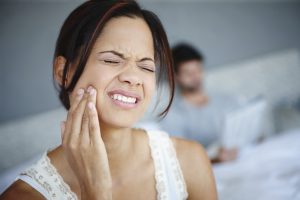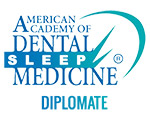 Temporomandibular joint disorder—usually called TMJ or TMD–impacts the joints that hinge the lower or mandibular jaw and the temporal bone of the skull. You can locate these joints easily by placing your fingers on either side of your face just in front of your ears. Open and close your mouth a couple of times and you’ll feel these joints working. When functioning properly, the temporomandibular joints allow you to open and close your mouth smoothly, so you can speak, eat, laugh and yawn. However, a malfunctioning joint can cause pain and discomfort. Fortunately, treatment for TMJ in State College is as close as the dentist’s office. Dr. Donald Marks will be able to determine whether or not you have TMJ and treat accordingly.
Temporomandibular joint disorder—usually called TMJ or TMD–impacts the joints that hinge the lower or mandibular jaw and the temporal bone of the skull. You can locate these joints easily by placing your fingers on either side of your face just in front of your ears. Open and close your mouth a couple of times and you’ll feel these joints working. When functioning properly, the temporomandibular joints allow you to open and close your mouth smoothly, so you can speak, eat, laugh and yawn. However, a malfunctioning joint can cause pain and discomfort. Fortunately, treatment for TMJ in State College is as close as the dentist’s office. Dr. Donald Marks will be able to determine whether or not you have TMJ and treat accordingly.
Symptoms of TMJ
For most TMJ sufferers, the common denominator is pain whenever they open or close their mouths. You may also experience some of the following symptoms, as well:
- A popping sound when you move your jaw
- Feeling as if your jaw is locked or stiff when you try to open your mouth to eat, speak or yawn
- Painful or sensitive teeth
- Tension headaches
- Facial swelling near your TMJs
- Upper and lower teeth not fitting together properly
- An earache but no infection
What Causes TMJ Disorder?
Dentists, doctors and researchers are not 100 percent certain what causes some people to develop TMJ disorder while most do not. Some possibilities are problems with the muscles of your jaw or the construction of the joint itself. This joint is a complicated balance of bone, muscle and cartilage; any imbalance among the three can be source of your TMJ problems. In addition, other possibilities include teeth grinding and clenching, which place unnatural pressure on these joints; arthritis in your TMJ; and stress.
State College TMJ Therapy
Because of TMJ’s uncomfortable symptoms as well as the possibility of tooth damage from grinding and clenching, Dr. Marks will check your jaw for signs of TMJ at each one of your dental checkups. TMJ therapy may include prescribing a custom-fitted oral appliance that you’ll wear while you sleep each night. Often called a nightguard, this comfortable appliance shields your upper and lower teeth from the pressure of grinding. Other home remedies include:
- Gently massaging the joint to relax the muscle and stimulate blood flow
- Yoga to reduce stress
- Taking small bites when having a meal
- Eating on both sides of your mouth
- Ibuprofen or acetaminophen for pain and swelling
Contact Our Office Today
You don’t have to put up with the pain of TMJ when a simple oral appliance can provide relief. Call the office of Dr. Marks today to schedule your TMJ consultation.




